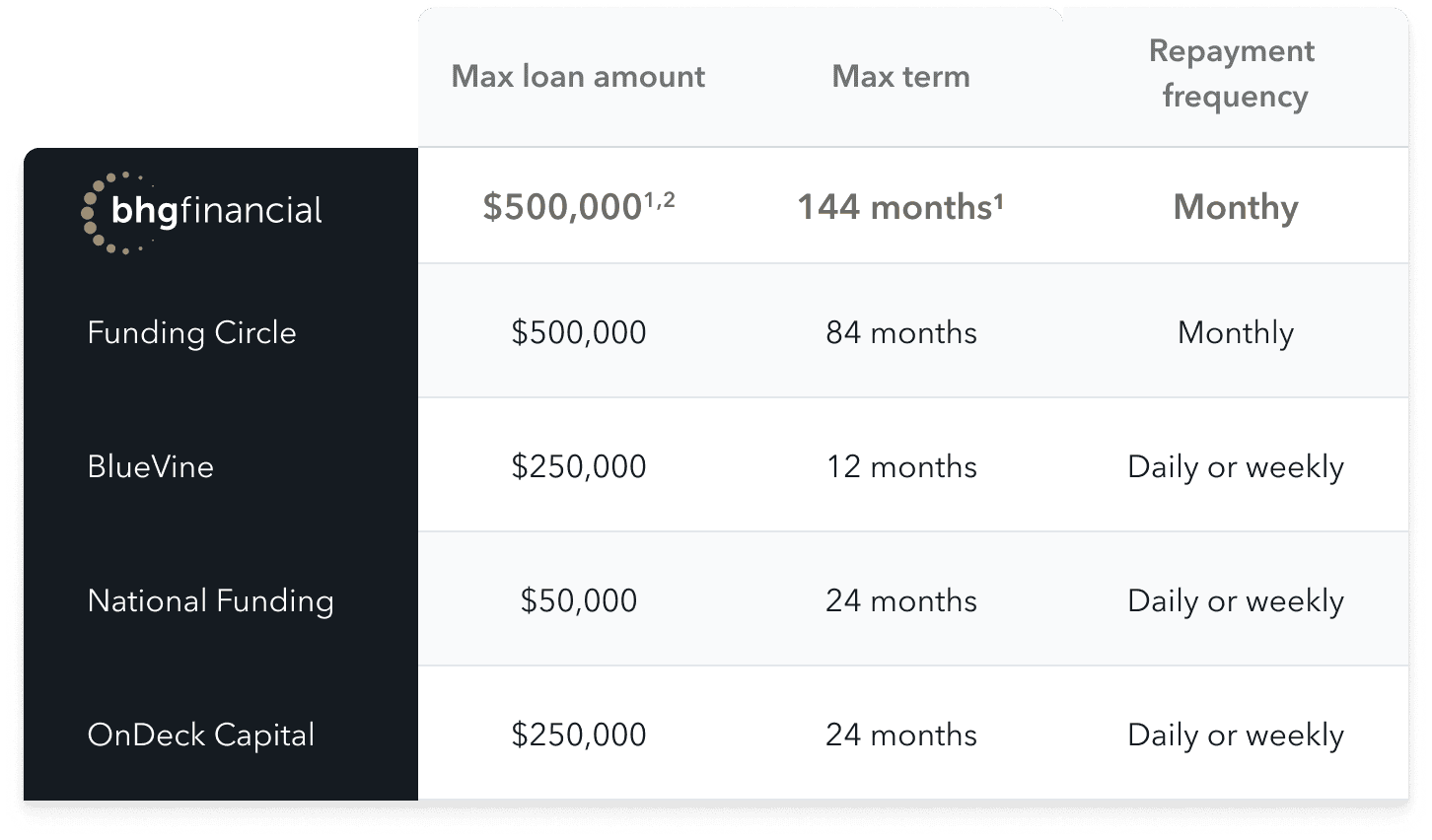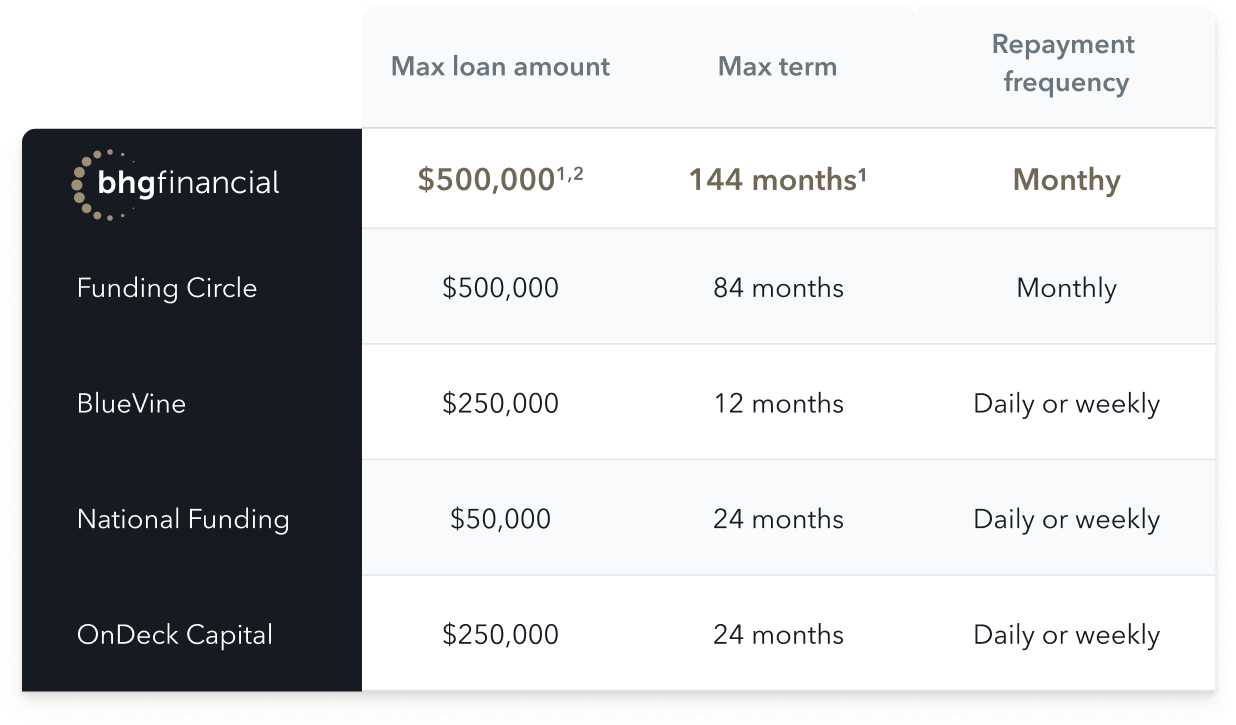Customized financing to consolidate high-interest debt and unlock financial flexibility.
WAYS TO USE YOUR LOAN
Tailored commercial financing that supports all your business needs to help you grow quickly.
Tailored for entrepreneurs that want to establish additional active and passive income streams.
Customized financing to consolidate high-interest debt or fund major purchases or expenses.
Estimates, articles, and answers to your frequently asked questions.
Small Business Loans
Business loans uniquely crafted for your goals
-
Large loan amounts: Up to $500K1,2
-
Fixed affordable payments: Terms up to 12 years1
-
Fast funding: In as few as 3 days3
-
Concierge service: U.S.-based loan specialists for every application
How much are you looking to finance?
No application fees, commitment, or impact on personal credit to view your estimate.


Small Business Loan Average Customer Stats
-
19 years in business
-
Personal FICO 740
-
Average loan amount $91K
Ways to use your funds
What can you use a business loan for?
We understand that success means different things to different businesses. You can count on BHG Financial to tailor a loan solution that addresses your business needs and helps you grow quickly.


SOURCE: NerdWallet - Accessed on 4.30.24"
Experience the BHG Financial Difference
One loan for all your business financial goals
At BHG Financial, we're committed to supporting you throughout your financial journey with tailored business financing.
-
Large amounts: Finance multiple initiatives with up to $500K1,2
-
Extended repayment terms: Terms up to 12 years1
-
Fixed rates: Monthly payments are affordable and manageable
Your finances—simplified
By taking advantage of our fixed rates and extended repayment terms,1 you can reduce your monthly payments and free up funds to invest more into your business.
Yearly Savings Comparision Example
Based on a loan for $250,000 (with an APR of 8.69%)
Industry Traditional
Short Term Loan (24 mo)
$11,386/mo
BHG Financial
Max Term (144 mo)
$2,802/mo*
Yearly savings
$103,008
Monthly payment is a representative example and for illustrative purposes only.
Advertised rates are subject to change without notice.
*BHG monthly payment based on BHG’s minimum available APR for a 12-year term, which is 8.69% as of 1/25/25. Your actual loan size, loan term, and monthly payment amount may vary based on your individual credit profile and other information provided in your loan application. Terms subject to credit approval.
A Hassle-Free Process
How our business loans work
As a busy business owner, your time is valuable. At BHG Financial, we’ve streamlined the application process to get you funded fast so that you can get back to business.


1. Start an application
Unlike other lenders, we won't ask for unnecessary paperwork. It’s easy and there’s no impact to your credit score to apply.
2. Get your funding decision
Approval can take as little as 24 hours.3 Our dedicated loan specialists will review your application and qualifications, tailoring a loan solution for your financing needs.
3. Receive funds fast
If approved, you will receive your funds in one lump sum in as few as 3 days.3
To achieve continued success, the country’s top professionals and business owners rely on BHG Financial for exceptional financing, a simplified lending process, and personalized service.
$23 Billion +
Loans funded
23 years
Lending experience
A+ Rating
BBB
216,000 +
Customers funded
How our business loans drive growth
BHG Financial is committed to the success of our customers.
LEARN MORE
Business Loans FAQs
No, a commercial loan (or business loan) is intended for business use, such as consolidating business debt, upgrading equipment or technology, or expanding to a new location.
A personal loan is intended for personal use, such as consolidating personal debt or improving a home.
Applying for a business loan with BHG Financial is as easy as 1-2-3.
- Fill out an online application quickly or call us directly to speak to a loan specialist.
- We'll gather the necessary documentation for you, which may include income verification documents such as tax returns and bank statements. If anything else is needed to process your application, we’ll reach out to work with you.
- After we’ve received all the necessary information and documents, our team will review your qualifications and notify you promptly regarding approval.
No, applying for our business loans will not impact your personal credit. We only perform a soft pull of your credit when you apply, so your score will remain intact. If your account becomes delinquent, we can report the delinquent trade line to the bureaus.
BHG Financial evaluates applicants based on credit history and personal and business income, among other factors provided at the time of the loan application.
The average BHG Financial business loan customer has a 740 FICO score, has been in business for 19 years and receives $91K in funding.
BHG Financial offers fixed-interest business loans up to $500,000.1,2 BHG Financial files a lien on the business via a Uniform Commercial Code (UCC) filing.
View your estimate
There is no cost, commitment, or impact on personal credit to see your estimate.
Not all solutions, loan amounts, rates or terms are available in all states.
¹ Terms subject to credit approval upon completion of an application. Loan sizes, interest rates, and loan terms vary based on the applicant's credit profile.
² BHG Financial business loans typically range from $20,000 to $250,000; however, well-qualified borrowers may be eligible for business loans up to $500,000.
³ This is not a guaranteed offer of credit and is subject to credit approval.
Business Loan Repayment Example: A $94,695 commercial loan with a 9-year term and an APR of 14.8% would require monthly payments of $1,591.
Testimonial(s) based on unique customer experience. Individual customer experiences may vary.
For California Residents: BHG Financial loans made or arranged pursuant to a California Financing Law license - Number 603G493.
IMPORTANT INFORMATION ABOUT ESTABLISHING A NEW CUSTOMER RELATIONSHIP
To help the government fight the funding of terrorism and money laundering activities, Federal law requires all financial institutions to obtain, verify and record information that identifies every customer. What this means for you: When you apply for a loan, we will ask for your name, address, date of birth, social security number and other information that will allow us to identify you. We may also ask to see your driver's license or other identifying documents. If all required documentation is not provided, we may be unable to establish a customer relationship with you.


